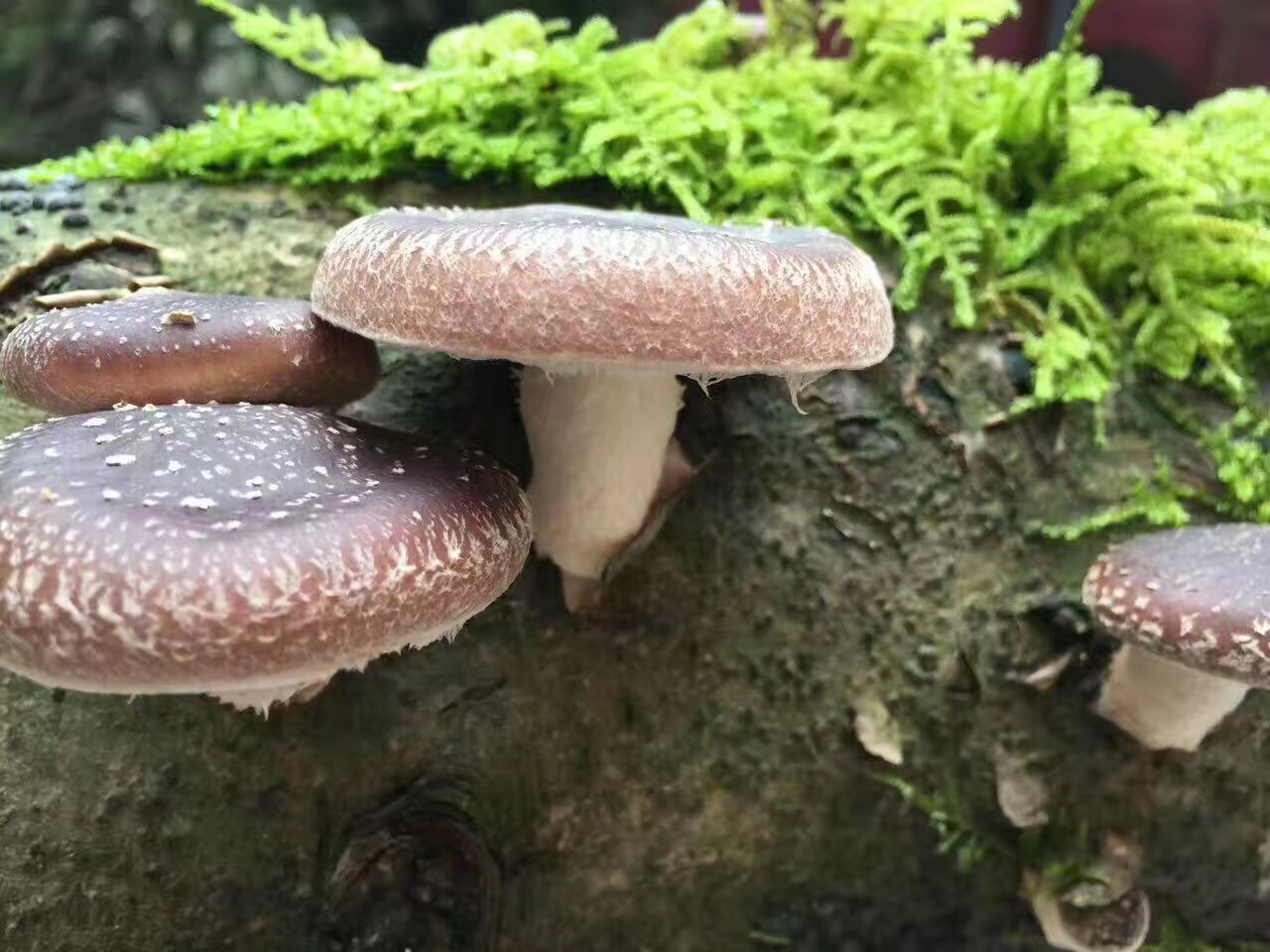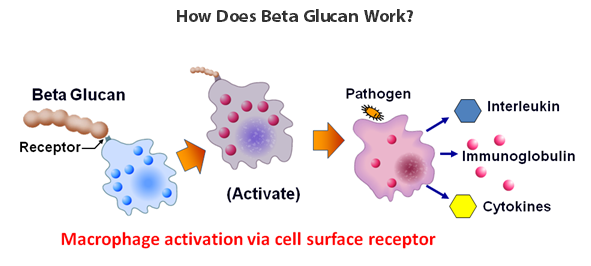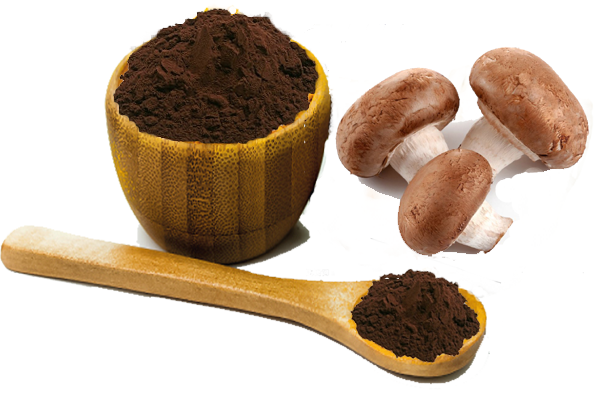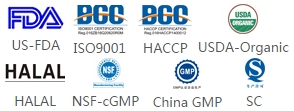
Shiitake Mushroom Extract Beta-D-Glucan 10% 20% 30%
Shiitake Mushroom Extract Beta-D-Glucan 10%, 20%, 30% by Enzyme solution-UV with analysis meets the EP, USP, JP, CP....
Shiitake Beta Glucan/ Shiitake Mushroom Extract Beta Glucan
Latin Name: Lentinus edodes
Extracting Part: fruit body
Supplied Purity: Beta Glucan 10%, 20%, 30% by Enzyme solution-UV
Other purity supplied like polysaccharides 10%~50%, triterpene 1%~8%, concentrate powder and fine powder

shiitake mushroom extract from MIGU
What is Beta Glucan and its history
Beta-glucan is a type of soluble fiber. Soluble fiber dissolves easily in water and can be broken down into a gel-like substance in the gut. Whereas insoluble fiber doesn’t dissolve in water and is left whole as it moves through the gastrointestinal tract. The body can’t produce beta-glucans, so you have to consume it from external sources.
Beta-glucan is naturally found in yeast, cereal grains and certain mushrooms such as shiitake, maitake, and reishi. You can also get beta-glucan in supplement form. Beta-glucan are naturally occurring complex carbohydrates that are found in the cell walls of certain foods. It belongs to a group of sugars known as polysaccharides.
This soluble fiber has been the subject of intensifying research due to its immune-boosting effects. It’s been studied for its ability to fight viruses and infections and the way it enhances the immune system. A number of the healing properties of mushrooms can be attributed to its beta-glucan content.
Cereal and fungal products have been used for centuries for medicinal and cosmetic purposes; however, the specific role of β-glucan was not explored until the 20th century. β-glucans were first discovered in lichens, and shortly thereafter in barley. A particular interest in oat β-glucan arose after a cholesterol lowering effect from oat bran reported in 1981.[2]
In 1997, the FDA approved of a claim that intake of at least 3.0 g of β-glucan from oats per day decreased absorption of dietary cholesterol and reduced the risk of coronary heart disease. The approved health claim was later amended to include these sources of β-glucan: rolled oats (oatmeal), oat bran, whole oat flour, oatrim (the soluble fraction of alpha-amylase hydrolyzed oat bran or whole oat flour), whole grain barley and barley beta-fiber. An example of an allowed label claim: Soluble fiber from foods such as oatmeal, as part of a diet low in saturated fat and cholesterol, may reduce the risk of heart disease. A serving of oatmeal supplies 0.75 grams of the 3.0 g of β-glucan soluble fiber necessary per day to have this effect. The claim language is in the Federal Register 21 CFR 101.81 Health Claims: Soluble fiber from certain foods and risk of coronary heart disease (CHD)
Mushroom Beta Glucan
While beta-glucan from other food sources are well-know, mushrooms may provide a unique opportunity for the discovery of novel bioactives with functional food potential, say researchers.
The team behind the study noted that while beta-glucan from other sources like yeasts and cereals are well known and have been extensively investigated in scientific literature, mushroom beta glucan are “not well documented”
Mushroom beta glucan provide a unique opportunity for the discovery of novel therapeutic agents and have attracted a great deal of attention due to many health benefits said the teamnoting that mushrooms beta gluacan have been suggested to have multiple beneficial properties including the potential to enhance innate and cell mediated immune responses and antimicrobial activities.
SHIITAKE Nutrition and Beta Glucan
Shiitake has a long history of traditional use for diseases involving depressed immune function (including AIDS), cancer, environmental allergies, fungal infection, frequent flu and colds, bronchial inflammation, heart disease, hyperlipidaemia (including high blood cholesterol), hypertension, infectious disease, diabetes, hepatitis, obesity, problems related to sexual dysfunction, ageing, liver ailments, respiratory diseases, exhaustion and weakness.[7]
Shiitake contains significant quantities of vitamins C, B1, B2, B12, niacin and vitamin D2 (being the highest content of vitamin D2/ergosterol of any plant food).[7]
It is a source of two well-studied and widely approved polysaccharides: LEM, a protein-bound polysaccharide derived only from the mycelium; and lentinan, a cell-wall branched beta-glucan extracted from both the fruiting body and mycelium. Both compounds are immune system enhancers that demonstrate anti-cancer activity.[7]
Vitamin D is known for its anti-inflammatory properties and extracts derived from shiitake exert an anti-inflammatory effect. Exposure to ultraviolet light increases vitamin D2 content in shiitake edible mushrooms and, following feeding of vitamin D-enriched mushroom extracts to mice with immune-mediated hepatitis, a significant decrease in liver damage was noted. The data supports its potential use as safe immunomodulatory adjuvant for the treatment of hepatitis C and nonalcoholic steatohepatitis.[8]
Beta Glucan: The Best Type of Polysaccharides
The medicinal properties of many species of mushroom have been valued and used in Traditional Chinese Medicine for centuries. More recently studies have demonstrated that the key active compounds with imunomodulatory activities such as polysaccharides, phenolic compounds, polysaccharopeptides, proteins, lipid components and terpenoids. These immunomodulatory effects and subsequent potential for therapeutic benefits are generating a renewed interest in the scientific investigation of medicinal mushrooms, represented in the market by continual steady increases in worldwide sales.
Beta-D-glucans are the most important compounds in the polysaccharides. In the mushroom polysaccharides mainly contains beta glucan and alpha glucans. Different with oats & grains molecule beta glucan are (1-4)-beta-glucans, the mushroom beta glucan molecule are (1-3)(1-6) beta-D-glucans which are specific in fungus and yeast. The beta glucan activates the immune system and might even have anticarcinogenic properties.And another ingredients in polysaccharides are alpha-glucans which like glycogen, pullulan, dextran and starch, most of time we called are the filler of mushroom products. And the dextran and starch is very common polysaccharides that is find in many products or foods like potatoes, corn, rice and grains.
From above we can see not high polysaccharides means high quality or great effective function. Only high beta glucan purity in mushroom means high effecitive in function.
How Does Beta Glucan Work?
Beta-glucan isn’t absorbed directly during the digestive process. Instead, it slows down the transit of food. What this means is that the body can take longer to digest foods which can lead to a number of health benefits. When food is digested slower, carbohydrates are absorbed more slowly. This helps to produce more steady blood sugar levels. In addition to this, beta-glucan can take cholesterol with it as it moves through the digestive system.
The specific source organism of beta-glucan can influence its health benefits. Beta-glucans from different sources vary slightly in structure. It’s this difference in the structure that’s thought to influence the effects of it. It’s suggested that the more complex the structure, the better the immune-boosting and anti-cancer effects will be.

shiitake beta glucan-How does beta glucan work
For example, the immune-boosting benefits of beta-glucan tend to be most prominent in medicinal mushrooms. Whereas, beta-glucan derived from cereal, particularly oats, has been found useful for managing cholesterol levels. You also have yeast-derived beta-glucan from baker’s yeast.
What are the Benefits of Beta Glucan?
1.Support the Immune System
Beta-glucans are known as biological response modifiers. This is because they activate the immune system. The immune-boosting benefit has been specifically linked to beta-glucan from yeast and medicinal mushrooms.
Related: Boost Your Immune System with Mushroom Superfoods!
Although more evidence is needed, researchers believe that beta-glucan could have positive effects on the immune system. The precise way it does this is still unclear but scientists think that beta-glucan may stimulate the immune system helping you to fight off viruses and infection more effectively.
The healing and immune-boosting properties of mushrooms have been known for thousands of years in countries throughout the world. These types of medicinal mushrooms like reishi and shiitake contain polysaccharides that mostly belong to beta-glucans. Beta-glucans increase host immune defense by stimulating the immune system and enhancing natural killer cell function. Natural killer cells are a type of cell that play an essential role in fighting off tumors and viruses.
2. Lower Cholesterol and Enhance Heart Health
There’s evidence that beta-glucan can help boost heart health by lowering cholesterol and triglycerides. Triglycerides are one of the most common types of fat in the body. When you combine high triglycerides and bad cholesterol with low levels of good cholesterol, your risk of stroke and heart attack increases.
The cholesterol-lowering benefits of beta-glucan have mainly been studied using cereal-derived beta-glucan. One study found that consuming oats with at least 3 g of beta-glucan led to a six to seven percent reduction in bad cholesterol levels.Related: Overnight Oats Recipes
3. Improve Gut Health
Beta-glucans form a major part of mushrooms. Used medicinally for thousands of years, mushrooms are still a relatively untapped power in the health world. As a rich source of carbohydrates like beta-glucans, mushrooms are a good choice of prebioticto help feed the gut. Prebiotics feed the friendly bacteria in the gut. Probiotics can feed off of it to produce a healthy and balanced microbiome.
We already know that a healthy microbiome helps produce the antibodies we need to fight off disease. Research shows that mushrooms act as a prebiotic to stimulate healthy growth of good bacteria in the gut. A healthy gut microbiome is linked to a lot of benefits like a strong immune system, brain health, heart health, good sleep, and improved mood. To boost your beta-glucan intake, try incorporating some reishi or oyster mushrooms into your diet.
4. Decrease Inflammation
Chronic inflammation is linked to several health conditions such as heart disease, stroke and some autoimmune disorders like lupus and rheumatoid arthritis. Acute inflammation is your body’s natural response to injury. But when inflammation is prolonged, it can lead to serious health problems. You can reduce inflammation in the body with a healthy diet and an active lifestyle. Related: Reducing Inflammation with a Healthy Diet
It’s thought that beta-glucans can decrease the body’s inflammatory response. Beta-glucans from fungi have been found to exhibit a range of activities including anti-tumor, immune-stimulating, and anti-inflammatory effects. The anti-inflammatory effect comes from beta-glucans’ ability to regulate inflammatory markers in the body.
5. May Fight Cancer
Initial research suggests that beta-glucan may help to combat cancer by activating several cancer-fighting cells like natural killer cells and T-cells. Preliminary studies have found that beta-glucan may help to stop the spread of cancer.
Beta-glucans may be able to treat cancer by activating certain immune cells and triggering a defensive response in the body. More research is still needed to find out the precise effect that beta-glucan has on the spread of cancer.
6. Regulate Blood Sugar Levels
Beta-glucan could be an effective way to manage diabetes as it helps to regulate blood sugar levels. Both oat and fungal beta-glucans have been shown to reduce blood glucose levels. By helping to regulate blood sugar levels, it could reduce the risk of developing type 2 diabetes and may help to improve blood sugar levels in people with diabetes.
Research suggests that beta-glucan isn’t enough to regulate blood sugar levels alone, but it could potentially be used as a complementary method alongside a healthy diet.
7. Lower Risk of Obesity
In America, more than two in three adults are considered to be overweight or obese. Obesity is a global problem that can have disastrous impacts on health and quality of life. Beta-glucan may help to reduce the risk of obesity.
Research shows that mushroom-derived beta-glucan has been found to prevent obesity in initial studies. One study found that beta-glucan from turkey tail mushrooms could be beneficial in the fight against obesity. The beta-glucan exhibited anti-obesity effects through specific activity in the gut microbiome.








